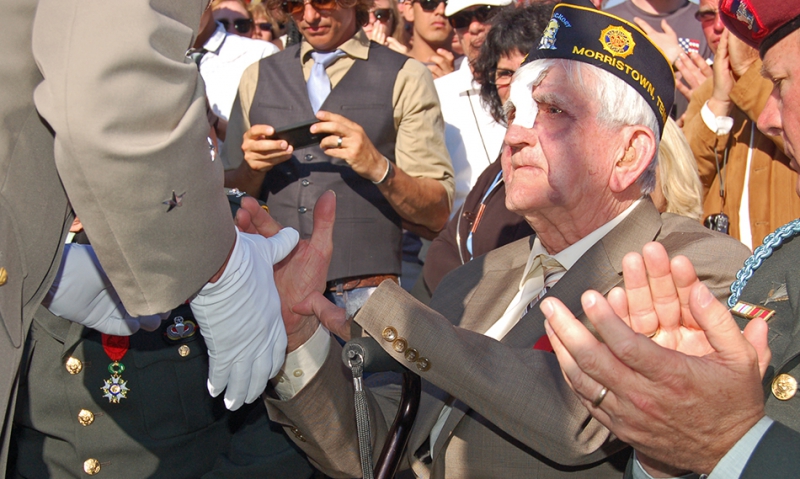
Omaha Beach veteran, a new Legionnaire, remembers the day that changed his life, and the world, forever.
Lawrence Brannan of Morristown, Tenn., has now been wounded twice in Normandy. Neither injury bothered him much.
Last week, Brannan returned to the coast of northern France with American Legion National Commander Daniel Dellinger and within minutes of arrival was asked to do a television interview on Omaha Beach. The 94-year-old veteran gladly obliged, but during the shoot on location, he fell on the rocks and broke his nose. “I’m OK,” he said after a hospital visit to Bayeux. “I’ve got a hard head.”
As Normandy injuries go, the broken nose did not compare to the grenade blast 70 years ago that obliterated all the fingers of his left hand, leaving him with just one thumb at the end of that arm for the rest of his life. “It didn’t bother me,” he said, adding that he never much cared for prosthetic hands and only used one for aesthetic reasons. “I got by just fine.”
On June 9, Brannan was decorated with the French Legion of Honor at a ceremony in Ste. Mere-Eglise, first town liberated in the Allied invasion that ultimately toppled Nazi Germany in World War II. Earlier in the week, on June 6, he had a seat of honor onstage with U.S. President Barack Obama and French President Francois Hollande for the binational ceremony at the Normandy American Cemetery. Also during the trip, Dellinger signed the D-Day veteran up for membership in The American Legion for the first time. Brannan proudly wore his new Legion cap to events and ceremonies among his fellow World War II veterans.
At the age of 24, Brannan was a private first class in an assault squad of the 29th U.S. Army Infantry Division. He came ashore in the third wave on June 6, 1944, at the Easy Red sector of Omaha Beach, at about 7:20 a.m. He remembers the 70 yards of sand, strewn with fallen American soldiers, that he and his squad had to traverse in order to reach cover. German bullets whizzed past them as they passed the dead and dying.
“I was under control,” Brannan remembers of that deadly morning. “I fully intended to do my job. If I got killed, I got killed. That was it. That was just the way I was trained.”
His squad, he explained, was well briefed about their mission. “We were told, ‘Whatever you do, take that bluff. We’ve got to have it.’ The company commander stood there and told us, ‘You’re going into combat, and people are going to get killed. And as far as we’re concerned, you are 100 percent expendable in those first 24 hours.’”
Brannan remembers firing into a German pillbox after he made it to cover. He hit something inside, and the bunker exploded. He also remembers shooting and killing an enemy soldier who was in the act of firing on U.S. troops. Brannan said that when he walked past the German he had just killed, “it didn’t affect me in the least little bit. I looked at that German, and nothing. I said to myself, ‘I’m fine.’ In combat, you know, people are going to get killed. Maybe me the next time.”
Later on June 6, however, he was wounded when his own grenade detonated in his left hand. He was treated in the field, then on a ship in the channel. Medics tried in futility to save his fingers. “They did the best they could,” said Brannan, who returned to eastern Tennessee after he was discharged and worked for more than 30 years at a Ford dealership.
After the war, like so many of his generation, Brannan worked hard, raised a family and kept his wartime experience largely to himself.
In the town of Ste. Mere-Eglise, during a ceremony where Commander Dellinger helped unveil a new monument honoring airborne troops who did not survive the campaign, that experience was remembered and respected by the nation he and his fellow veterans helped liberate.
- Honor & Remembrance

